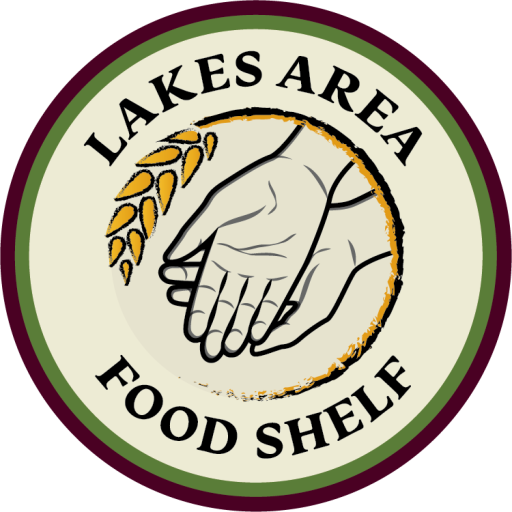Hunger in Minnesota
Hunger In Minnesota A Growing Concern
Inflation and End of Pandemic Relief Programs Drive Increases
Recently released data from Minnesota Hunger Solutions shows significant spikes in use of food shelf services, a trend confirmed by Lakes Area Food Shelf. In 2022, Minnesotans made over 5.5 million visits to food shelves, 1.9 million more visits than 2021, the agency reported. Hunger Solutions is a non-profit organization that has monitored food insecurity in the state since 2001.
“The spikes in cost of living in 2022 brought in the so-called ‘working poor,’ people who work two and three jobs, but still can’t afford the high costs of housing, food, and gas,” explained Food Shelf Director Kathy Adams. “The numbers are high and growing.”
More Than Numbers, Our Friends and Neighbors
In 2022, Lakes Area Food Shelf served 10,978 Individuals and 3,763 Households, more than doubling the amount in both 2020 and 2021. The economic pressures aren’t letting up in 2023. The United States Department of Agriculture (USDA) projects overall food prices will rise 4.2-10.1% in 2023; packaged foods are predicted to rise 4.5-11.7%. Some food categories are expected to rise faster: eggs 27.3%, dairy 8% ,oils 16.5%, cereals and bakery products 12%. Price pressures leave many Lakes Area residents short of cash and with an awful choice.
“Do I skip a meal so I can pay the rent? Do I skip multiple meals so I can pay for gas? Lack of food is often an outcome of many pressures facing individuals and families. We see these situations daily,” said LAFS Board President Tim Moore. “And, the need is growing. New data from Feeding America puts ‘food insecurity’ – that’s the government’s description for hungry people — in a range of 9% to almost 12% in the Brainerd Lakes region.”
Any one of us could be counted in these numbers. One unexpected life event could push anyone into a shortage of funds, or make them unable to care for themselves. They’re our Friends and Neighbors, the people we see on the street, or at the playground, or in church. “The hungry” can easily become you or me.
We know the hunger issue cuts across the population. Who comes to the Food Shelf?
“Seniors living solely on social security because an unexpected health condition puts them in peril financially. Grandparents who suddenly find themselves caring for their grandchildren. Middle-aged Individuals who move parents in with their family for care as their health declines,” LAFS Director Kathy Adams runs down the list. “Working Parents with rent increasing by 30 to 50%. Unemployed who lost jobs in the pandemic or were hospitalized for months and lost their jobs. We see everyone.”
What Can You Do?
First, if you know someone who is going hungry or skipping meals because of budget pressures, send them to the Lakes Area Food Shelf. We are committed to helping them meet their needs with relief that’s non-judgemental, respectful, and allows the person or family to maintain their dignity.
Second, send a donation. Lakes Area Food Shelf can stretch a dollar a long way. We purchase most of our food from our Food Bank, Second Harvest North Central Food Bank (Grand Rapids, MN), which offers us heavily discounted products. And, we work with area grocery partners including Cub Foods, Pequot Lakes Super Valu, COSTCO, Target, and Schaefer’s Foods on food rescue and low-price or no-price items. We’re growing our use of fresh produce through partnerships with area farmers. We can get much more from a dollar than a donor may through buying a few extras on a weekly grocery visit.
Is Hunger A “Forever” Issue
Truthfully, the answer is “yes” for some who may be disabled and unable to work and for others who don’t have the skills or opportunities to earn a living wage. However, Lakes Area Food Shelf is committed to helping those who come through our doors. We’re committed to finding relief from some of the larger barriers in their lives that prohibit them from becoming hunger free and obtaining a healthy lifestyle. LAFS is partnering with local social service providers to establish a Community Resources Hub.
Community Resource Hubs, integrated within the food shelf, house a network of existing direct service providers from multiple disciplines (legal, housing, counseling, job training, etc.). The partnership creates navigators who provide help beyond food, all the while protecting individual privacy and advocating without judgment. LAFS is actively seeking partners to staff the hub.
“As we offer meals, we have an opportunity to help people work through the challenges of paying rent or getting healthcare or finding a way to fill their gas tank,” said LAFS Board President Tim Moore.
Feeding America – the leading non-profit hunger advocacy organization in the U.S. – supports this holistic approach – from their website:
“We recognize that hunger is a complex issue. When people face hunger, they o9en struggle to meet other basic needs as well — such as housing, employment, and healthcare. That’s why Feeding America is committed to more than providing food for people in need. We also want to make progress toward ending hunger for good. To do this, Feeding America aims to meet people’s needs holistically by partnering with other organizations that address everything from homelessness to health care. Together, we can find the most innovative ways to help the people we serve and achieve a hunger-free America”

